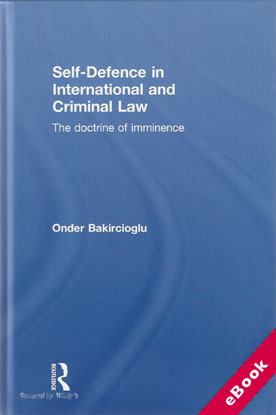
The device(s) you use to access the eBook content must be authorized with an Adobe ID before you download the product otherwise it will fail to register correctly.
For further information see https://www.wildy.com/ebook-formats
Once the order is confirmed an automated e-mail will be sent to you to allow you to download the eBook.
All eBooks are supplied firm sale and cannot be returned. If you believe there is a fault with your eBook then contact us on ebooks@wildy.com and we will help in resolving the issue. This does not affect your statutory rights.
The book provides a broad and interdisciplinary approach to the doctrine of self-defence in both domestic criminal and international law.
In particular it focuses on the requirement of imminence, which deals with the question of when individuals or States may legitimately resort to defensive force against a serious danger or harm. In both national and international law the imminence requirement, if strictly applied, renders any defensive measure taken in anticipation of a would-be attack illegal.
Recently, however, attempts have been made to relax the temporal requirement of the self-defence doctrine (imminence) with a view to allowing individuals or States to employ deadly force to arrest an anticipated threat when they ‘believe’ that using ‘pre-emptive’ lethal force would be the only way to thwart an expected harm. In domestic criminal law some people have argued it is necessary to relax the rule of imminence in domestic violence cases where women employ lethal force against their abusive partners when there is no imminent threat to justify defensive force.
At the international level, while there has long been controversy as to the justifiability of pre-emptive force in non-confrontational settings, following the September 11 attacks the Bush Administration, with its ‘war on terror’ policy, radically shifted the focus from the notion of anticipation to that of prevention, making it clear that, if necessary, it would invoke unilateral force against emerging threats before they are fully formed.
Drawing from scholarship across law, history, politics and philosophy, this book explores the permissibility of employing preventive force under the law of individual and national self-defence. The book illustrates how the law of international self-defence, and in particular the requirement of imminence, has been subjected to controversy in parallel with its domestic counterpart.
In both disciplines the debate over imminence is centred on similar concerns, issues and tensions despite the fact the arguments put forward are designed to address different scenarios. The book surveys the roots, role, rationale, and objectives of self-defence and questions whether the requirement of imminence should be removed from the traditional contours of the self-defence doctrine in national and international law.